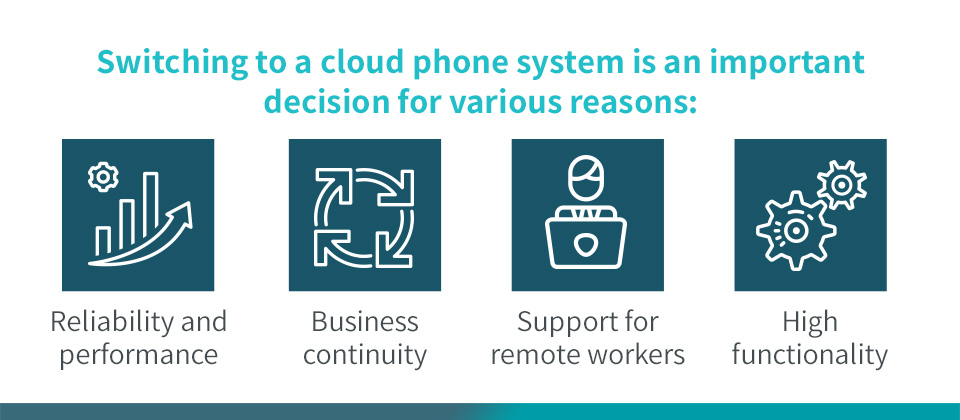
The Importance of a Cloud Telephone Service
Cloud-based telephone systems are becoming increasingly popular among companies looking to digitize and future-proof their organizations. In fact, experts predict the cloud phone services market to expand at a compound annual growth rate of 9.7% between 2023 and 2033. Cloud-based telephone systems can benefit businesses of any size and in any market sector, though implementing them requires careful planning and consideration to ensure effectiveness.
What Are Cloud Telephone Systems?
A cloud telephone system is a specific type of unified communications as a service (UCaaS), a business model that also includes:
- Phone calls
- Instant messaging
- SMS messaging
- Video conferencing
- Conference calls
- File sharing
It works by using voice over internet protocol (VoIP). When you place a VoIP call, the technology transforms your voice into a series of data packets, which it transmits over the internet. It then converts the packets to the correct format upon arriving at their destination. For example, you could call a co-worker’s phone directly from your computer using VoIP technology, even if you are in two different locations.
That said, it’s important to understand the differences between a cloud phone system and VoIP:
- Cloud phone system: This term refers to how a system stores and manages information. In a cloud-based phone system, user data is stored and managed via the cloud.
- VoIP: This term specifically refers to the method a system uses to transfer data. In the case of a VoIP system, it means sending data in packets across the internet.
Although a cloud phone system typically uses VoIP to transmit voice signals during a call, a VoIP system does not necessarily require cloud technology to function. Both require a stable connection to the internet.
Why Are Cloud-Based Telephone Systems Important?
Switching to a cloud phone system is an important decision for various reasons:

- Reliability and performance: Cloud-based VoIP phone systems provide redundancy by backing up their data to multiple remote data centers. This model enables the system to provide consistently high performance with minimal disruptions.
- Business continuity: A cloud-based phone system can help you minimize downtime and maintain high performance even in the event of an emergency.
- Support for remote workers: Users can access cloud-based telephony services from virtually anywhere with an internet connection, enabling you to provide a secure means of communication to your remote and hybrid workforce.
- High functionality: Cloud-based phone systems come with more advanced features than traditional landlines, enabling you to communicate in more ways and helping you maximize your investment.
That said, it’s also important to mention the drawbacks of cloud-based telephony. Some possible downsides to be aware of include:
- Internet requirement: Unlike traditional phone systems, cloud systems rely on the internet to work properly. In locations with a weak internet connection, your audio signal may become choppy or experience significant latency.
- Integration limitations: While VoIP systems integrate with most modern business applications, few are compatible with analog equipment. This lack of integration requires users of older systems to switch back and forth between applications to complete their tasks, costing valuable time.
- Emergency calls: Because you are calling over the internet rather than a traditional cell connection or landline, emergency services may have difficulties pinpointing your location if you need help.
A knowledgeable representative can help you weigh these pros and cons so you can make the most informed decision for your business.
Benefits of a Cloud-Based Phone System
While switching to a cloud-based system from a conventional PBX setup can be a complex process, it is often more beneficial for companies in the long run. Some of the most notable benefits of cloud telephony services include:
- Scalability: Every organization needs space to scale up so it can remain competitive within its industry. Because these services exist on cloud infrastructure, your company has the flexibility to add new users and features when necessary.
- Cost savings: A VoIP system eliminates the need to purchase and manage duplicate telecommunications equipment across multiple locations, significantly reducing equipment costs. Additionally, you can save on international calling, which is often costly with conventional landlines.
- Low maintenance: Cloud-based VoIP systems require minimal maintenance, potentially saving you hundreds or even thousands in equipment costs.
- User-friendly: Any authorized user can access your communication software through a web- or app-based portal that integrates seamlessly with your existing tech stack.
- Security: A professional VoIP vendor will adhere to cybersecurity standards such as Session Initiation Protocol and Transmission Control Protocol.
- Easy implementation: Cloud telephony is easier to implement and set up than conventional landline systems, helping save your organization valuable time and money in generating ROI.
Key Considerations When Adopting Cloud-Based Phone Services
Although cloud phone systems are typically much easier to set up than conventional landlines and PBX systems, you can take certain actions to ensure the process goes smoothly.
Consider the following before investing in a cloud telephony service:
- Internet strength: Since reliable internet access is essential for VoIP systems to work, make sure all company and employee locations, such as corporate buildings and home offices, have a strong, stable connection.
- Regulatory compliance: It is vital to verify that the cloud phone service complies with legal requirements. The specific regulations and standards you must adhere to will depend on your geographic location and industry, so it’s important to consult local laws to understand your obligations.
- Data security: Although VoIP is a secure form of communication, you should thoroughly understand which security measures your provider has in place. A solution with robust security protocols can protect your business against serious security incidents such as data breaches and ransomware attacks.
- Ongoing support: Comprehensive customer support is essential for maximizing your investment, as it can help you overcome issues you encounter before they lead to serious business consequences.
Gain the Benefits of Cloud Telephony With DataSpan
Is your company looking for a cost-effective, low-maintenance communication solution that can benefit everyone in your organization? Working with a professional IT or telecommunications consultant can help you determine your next steps if you need to upgrade your system to support VoIP calls. With a range of consulting, support and troubleshooting services, the DataSpan team is here to help you find the right solutions for your enterprise data center.
We source our cloud telephony products from the most reliable software vendors on the market to ensure you can maximize your investment. With 50 years of experience in the IT industry, you can count on us to provide reliable service and advice for any issue you encounter. Contact your local DataSpan representative today to discuss your organization’s needs.








